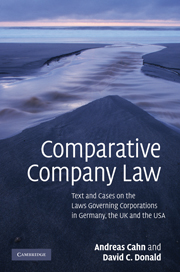 Comparative Company Law
Comparative Company Law Book contents
- Frontmatter
- Contents
- List of figures
- List of tables
- Preface and acknowledgments
- Glossary
- List of abbreviations
- Table of cases
- Table of legislation
- PART I The essential qualities of the corporation
- PART II The corporation and its capital
- 4 Incorporating the company
- 5 Constituting the company's share capital
- 6 Increasing the company's capital
- 7 Distribution of dividends and maintenance of share capital
- 8 Repurchases of shares
- 9 The nature of shares and classes of shares
- PART III Governing the corporation
- PART IV Corporate combinations, groups and takeovers
- References
- Index
7 - Distribution of dividends and maintenance of share capital
from PART II - The corporation and its capital
- Frontmatter
- Contents
- List of figures
- List of tables
- Preface and acknowledgments
- Glossary
- List of abbreviations
- Table of cases
- Table of legislation
- PART I The essential qualities of the corporation
- PART II The corporation and its capital
- 4 Incorporating the company
- 5 Constituting the company's share capital
- 6 Increasing the company's capital
- 7 Distribution of dividends and maintenance of share capital
- 8 Repurchases of shares
- 9 The nature of shares and classes of shares
- PART III Governing the corporation
- PART IV Corporate combinations, groups and takeovers
- References
- Index
Summary
Required reading
EU: Second Company Law Directive, arts. 15, 16
D: AktG, §§ 57–62, 66, 119(1) no. 2, 150, 158, 174, 254; HGB, § 272; GmbHG, § 30; BGB, §§ 134, 985
UK: CA 2006, secs. 829–831, 836–846; SI 2008 No. 3229, Regs. 70–77
US: DGCL, §§ 154, 170, 173, 174, 244; Uniform Fraudulent Transfers Act, §§ 1–5
Maintaining the share capital
In the preceding chapters, we examined the rules designed to constitute the company's share capital and ensure that the funds paid or assets contributed for this purpose have the promised value. Here we will discuss capital maintenance rules that seek to protect unsecured creditors by preventing shareholders from paying those corporate assets to which such creditors look to for repayment out to themselves. Legal limits on dividends go to the heart of a company's value. Although in theory the payment of dividends should not have a significant impact on share price because capital gains serve to compensate for an absence of such distributions, in practice dividend payments are indeed crucial to share price. This is particularly true for corporate shareholders, which some jurisdictions tax more favorably for dividend than for capital gain income. Thus, shareholders have a strong interest in the distribution of dividends and creditors have an equally strong interest in not having the corporate capital of their debtor excessively depleted by such distributions.
- Type
- Chapter
- Information
- Comparative Company LawText and Cases on the Laws Governing Corporations in Germany, the UK and the USA, pp. 219 - 240Publisher: Cambridge University PressPrint publication year: 2010


